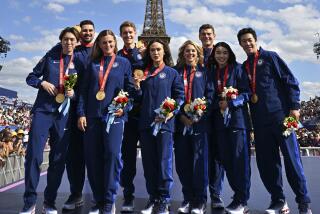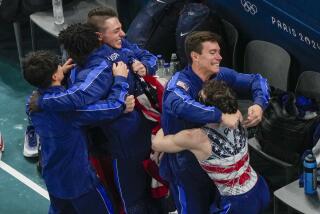Goodwill Games Roundup : Soviet Union Beats United States By 99 Medals
- Share via
MOSCOW — The Soviet Union, which dominated the inaugural Goodwill Games, ended the competition with a flourish Sunday, capturing 13 gold medals and finishing with 99 more medals than the United States.
The games, billed as a battle of the superpowers, was a mismatch, as the powerful Soviets overwhelmed the Americans.
Sunday, the Soviets won 9 of 11 head-to-head races against the Americans in rowing at the Krylatskoye rowing canal, they took all three medals in super heavyweight weightlifting, as Leonid Taranenko won the snatch, clean-and-jerk and overall titles, and they grabbed one of a possible two golds in judo.
That, along with six silvers, gave the Soviets a total of 118 golds and 241 medals overall.
The Americans, meanwhile, earned only the two golds and nine silvers in rowing, including an upset by their men’s eight-oar team over the Soviet world champions, and finished with 42 golds and 142 medals overall.
Following the competition Sunday, the games, designed to promote goodwill and peace, were officially ended with the Closing Ceremony. And the organizers, including American broadcasting magnate Ted Turner, looked optimistically ahead to the next scheduled Goodwill Games, at Seattle, in 1990.
Turner and Robert Wussler, executive vice president of Turner Broadcasting System, said they hope to attract 5,000 athletes and more than 100 countries to Seattle, compared with some 3,500 athletes and 76 countries that competed in Moscow.
Sunday, the big surprise was the performance of the U.S. eight-oared rowing team, which powered through the canal in 5 minutes 36.98 seconds, upsetting the Soviet Union (5:41.22).
Christopher Penny of Middletown, R.I., said the team had been put together about two weeks ago, and, “this is the first time we’ve done 2,000 (meters) at race cadence.”
“The eight is our priority boat,” team leader Peter Zanderberger said.
Angie Herron of East Thetford, Vt., registered the Americans’ other rowing victory, winning the women’s lightweight single sculls in 7:53.05 over the Soviets’ Tatyana Mironova (7:59.15).
The victories by the 30-year-old Taranenko in weightlifting also were a surprise. His teammate, Alexander Gunyashev, the overall world record-holder, finished second in all three categories.
In judo, the Soviets’ Khabil Biktashev took the open title, beating Andrezhj Basik of Poland, 10-0, and Mikihiro Mukai of Japan won the 132-pound crown, defeating Igor Zhuchkov of the Soviet Union, 1-0, on a referee’s decision.
The 17-day, 18-sport festivities were highlighted by six world records, most notably those by the Soviets’ Sergei Bubka in the pole vault, the United States’ Jackie Joyner in the heptathlon and Soviet swimmer Vladimir Salnikov in the men’s 800-meter freestyle.
Despite some magnificent performances, the games failed to attract the expected large crowds.
TBS, which televised 129 hours of the games in the United States, also admittedly was a victim of low ratings. Nevertheless, Wussler called the games “an unqualified success,” and Marat Gramov, head of the Soviet Sports Committee, predicted the games would improve superpower relations.
That was the intention put forth by Turner and the Soviet organizers when they conceived the games a year ago.
More to Read
Go beyond the scoreboard
Get the latest on L.A.'s teams in the daily Sports Report newsletter.
You may occasionally receive promotional content from the Los Angeles Times.






